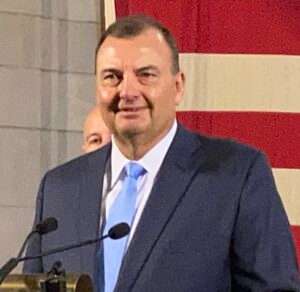By PAUL HAMMEL
Nebraska Examiner
LINCOLN — Additional property tax relief may be working its way into a bill designed to reduce state income taxes.
The development comes after the income tax proposal, Legislative Bill 939, advanced from first-round debate but only after the prime sponsor of the bill, State Sen. Lou Ann Linehan, promised to amend the bill before second-round debate.
Linehan declined to comment on what amendments are being considered, saying only that negotiations are ongoing.
But other legislative sources told the Nebraska Examiner that at least one of the amendments to the bill being discussed would provide more property tax relief, perhaps $200 million more, by increasing the state income tax credits that provides a refund for property taxes paid for K-12 education.

That amendment would conceivably bring more support from rural senators, who place property tax relief, and not cuts in income taxes, as their No. 1 priority.
State chamber seeks cut
Cutting the state’s top income tax rate has been a long-time goal of another major lobbying force at the State Capitol: the state’s business community.
As now written, LB 939 would reduce the state’s top individual income tax rate of 6.84% to 5.84% after three years. The bill would also reduce the state’s corporate income tax rate to 5.84% by tax year 2026, from the current 7.1%.
Business groups argue that Nebraska’s top income tax rate discourages businesses and workers from locating in the state. The state’s 6.84% top rate is the highest among neighboring states, with the exception of Iowa.
But Iowa Gov. Kim Reynolds recently signed into law a bill that establishes a flat tax of 3.9% in the Hawkeye State.
Said to be falling behind
Bryan Slone, the president of the Nebraska Chamber of Commerce and Industry, told members of the Revenue Committee that the Cornhusker State is falling behind and must reduce its top income tax rate or risk losing out on growth opportunities.

Linehan, who chairs the Revenue Committee, has made the same argument, as has fellow Republican Gov. Pete Ricketts.
The state income tax credit on property taxes paid was part of a major tax cut/reform package passed in 2020 as LB 1107. This year, it’s expected to provide a 25% refund on those taxes.
Economic forecast
The idea of working in some property tax relief as part of LB 939 gained momentum after the Nebraska Economic Forecasting Advisory Board raised its prediction of state tax revenue by $370 million for the current fiscal year and $405 million for fiscal year 2022-23.
LB 939 could use some more support. The bill had to overcome a filibuster to advance from first-round debate on Feb. 24. The 40-1 vote was deceptive because several senators provided a “yes” vote on the condition that some compromises would be made before it came up for second-round debate.
Lincoln Sen. Matt Hansen, who led the opposition to LB 939 during first round debate, said additional property tax relief won’t make him a supporter of the bill.
He said his biggest problem with the LB 939 was that it was billed as a “middle class” tax cut, when most of the benefits go to the state’s wealthiest taxpayers.
“All these people who don’t fall in the highest bracket don’t get anything,” he said.
Out-of-state entities
The Lincoln-based Open Sky Policy Institute has also opposed LB 939, arguing that 83% of the corporate income tax cut would benefit out-of-state entities and that it won’t serve to encourage companies to move to Nebraska.
Farm groups have long made the argument that income, sales and property taxes paid in Nebraska should be roughly the same.
But the “three-legged stool” is not in alignment. An analysis of taxes paid in 2020 by University of Nebraska ag economist David Aiken indicates that property taxes account for 38% of the state’s total tax payments, with sales taxes amounting to 29% of the total, and income taxes 26%.
Additional property tax reductions, rural senators argue, are needed to keep the taxes somewhat balanced if income tax cuts are to pass.
It’s unclear when the income tax proposal will come up again for debate. The Legislature is scheduled over the next two weeks to debate the state budget and proposals for spending its $1 billion allocation from the American Rescue Plan Act (ARPA).




